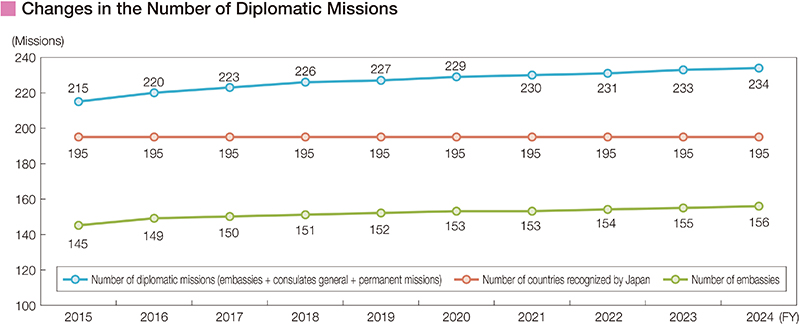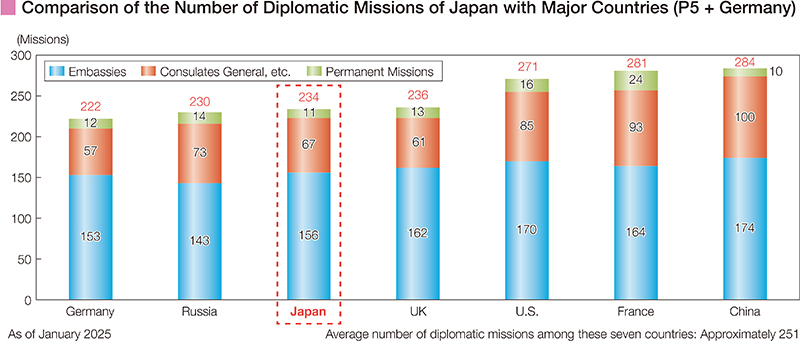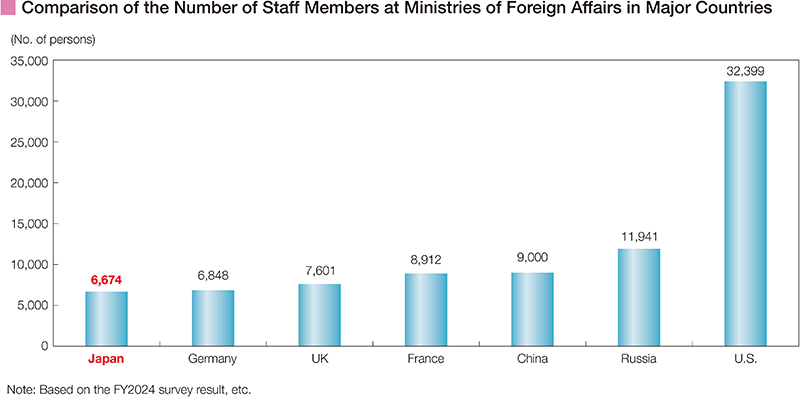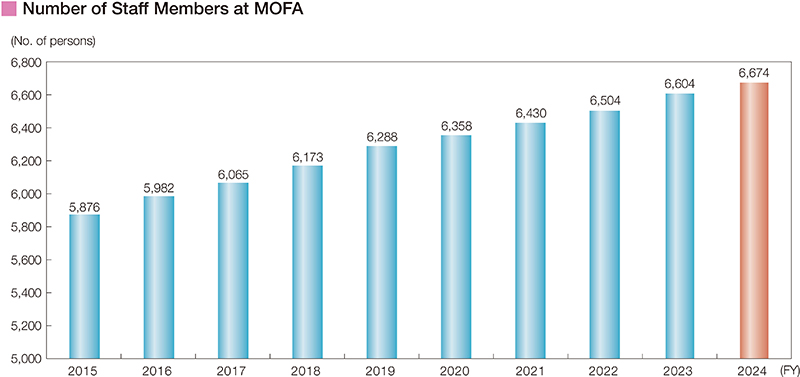Diplomatic Bluebook 2025
Chapter 4
Japan's Diplomacy Open to the Public
2 Strengthening the Foreign Policy Implementation Structure
While Japan is facing the most severe and complex security environment in the post-war era, it is vital to fundamentally strengthen the foreign policy implementation structure to promote diplomatic power for maintaining and developing an international order based on the rule of law. To that end, MOFA is working on strengthening its diplomatic missions overseas in both the aspects of quantity and quality, as well as advancing efforts to improve the organizational and personnel systems at MOFA itself.
Diplomatic missions overseas, such as embassies and consulates general, not only represent Japan and engage in diplomatic activities, but also play a key role in areas such as information-gathering and strategic external communication at the frontline of diplomacy. At the same time, diplomatic missions also carry out operations directly related to enhancing the interests of Japanese nationals, such as protecting their lives and safety, providing support for Japanese companies, promoting investment and tourism, and securing energy and other resources.
Given this environment, in January 2025 Japan established an embassy in Eritrea as well as a Permanent Mission of Japan to the International Organizations in Nairobi, Kenya.
Eritrea is in a geopolitically-critical location along international sea lanes linking the Indo-Pacific and Europe, making it an important country for the promotion of a “Free and Open Indo-Pacific (FOIP).” Moreover, Eritrea is a neighbor of Sudan, where armed conflict has been ongoing since April 2023, and has deep historical ties with Ethiopia, which is highly influential in regional peace and stability, making Eritrea a new site of information gathering in East Africa. In addition, as Eritrea has rich mineral, fisheries, and tourism resources, and good ports on the Red Sea, Japanese companies have expressed interest in investing in Eritrea. Given all these factors, it is necessary to further strengthen cooperation via opening an embassy to promote economic activity between both countries.
Nairobi is the location of international organization headquarters, which play a key role in discussions about international environmental and urban issues, including those of the United Nations Environment Programme (UNEP) and United Nations Human Settlements Programme (UN-Habitat). UNEP is a general coordination organization focusing solely on the environmental field, and is an important partner for Japan in promoting international cooperation regarding the environment. UNEP is the secretariat of many multilateral environmental treaties and also functions as the secretariat of the intergovernmental negotiating committee (INC) working toward formulating treaties about marine plastic litter. It is playing an extremely important role in these treaty negotiations. UN-Habitat is a United Nations (UN) agency engaged in a wide range of issues regarding human settlement. It contributes to initiatives toward achieving the Sustainable Development Goals (SDGs), including addressing a variety of issues facing cities. Building on establishing a Permanent Mission of Japan in January 2025, MOFA will strengthen its engagement in creating rules in the environmental field as well as in initiatives toward achieving Japan's SDGs which will have an impact on Japanese citizens' daily lives.
In addition to establishing more diplomatic missions overseas, it is important to secure and increase the number of staff members to support diplomacy at the MOFA headquarters and diplomatic missions overseas. In the context of the current severe budget and staff situation for the Government overall, the number of staff members at MOFA was increased in FY2024 by 70(2) to 6,674 from FY2023 in order to strengthen cooperation with allies and like-minded countries, reinforce MOFA's information capabilities including countering disinformation, utilize Official Development Assistance (ODA) strategically, strengthen protection measures for Japanese nationals abroad, and enhance the consular structure. The number of staff members, however, remains insufficient in comparison with other major countries. MOFA continues its efforts to build a structure that is commensurate with Japan's national power and diplomatic policy. In the meantime, based on the belief that enhancing the diplomatic and consular policy implementation structure remains essential in FY2025, MOFA will increase its workforce by 87 staff.
In order to maintain and strengthen a free and open international order based on the rule of law, MOFA appropriated 741.7 billion yen in the budget for FY2024 (of which 16.0 billion yen is appropriated in the Digital Agency budget). Furthermore, MOFA appropriated 214.5 billion yen in the supplementary budget for FY2024 (of which 6.41 billion yen is appropriated in the Digital Agency budget). The funding appropriated in the supplementary budget was for measures addressing pressing diplomatic issues, principally support for Ukraine as well as promoting business with Africa and the Association of Southeast Asian Nations (ASEAN) and strengthening cooperation with countries of the Global South, including humanitarian assistance in the Middle East and Africa.
MOFA's FY2025 government budget proposal appropriated 761.7 billion yen (of which 16.9 billion yen is appropriated in the Digital Agency budget) based on the following priorities: (a) responding to an increasingly severe and complex security environment, (b) strengthening Japan's economic power, and (c) enhancing the foreign policy and consular policy implementation structure. This includes budgets for initiatives toward realizing FOIP, for strengthening relationships with countries of the Global South, for support for Ukraine and countries affected by the situation in Ukraine, for responding to the situation in Israel and Palestine, for Official Security Assistance (OSA), for support for the overseas expansion and business growth of Japanese companies through public-private cooperation by a concerted national effort, for strengthening initiatives toward the era of information warfare, and for enhancing the resilience and functions of Japan's diplomatic missions overseas.
In order to promote Japan's national interests, Japan will continue to proceed strategically to develop the foreign policy implementation structure and enhance it further, while making efforts to streamline operations.




- (2) Includes special provision (for one year only) for six additional new recruits in accordance with the increase in the compulsory retirement age.
